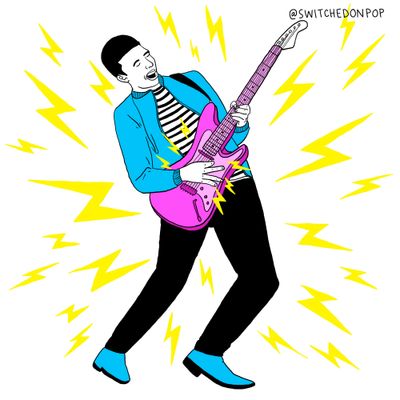
Cory Wong is a Minneapolis native and frequent collaborator of Michigan funk band Vulfpeck known for pushing rhythm guitar from a background instrument to the star of the show. He’s also a walking encyclopedia of funk-guitar riffs and styles from James Brown to Prince, with an unerring ear for the patterns that have kept people dancing for decades. It’s crucial knowledge to have at the ready as funky guitar is making a comeback, both on the charts in hits like Dua Lipa’s “Levitating” and on throwback bops like Jessie Ware’s “Step Into My Life.”
For most, the subtle differences in guitar patterns from song to song, genre to genre, might escape us. But for Wong, rhythm guitar isn’t just a source of propulsive groove; it’s a sound that’s intimately connected to regional music scenes: Change one note in a riff, and you’ve traveled from Philadelphia soul to Cincinnati funk. Every “bubble” and “chuck” on the guitar speaks to a history of local musical innovation.
Tour through this history of rhythm guitar, and the innovations of Chic legend Nile Rodgers loom large. In this week’s episode of Switched on Pop, co-host Nate Sloan speaks to Cory Wong about how listening closely to rhythm guitar can bring us closer to Rodgers’s central role in shaping the sound of modern pop.
Nate Sloan: I feel like if I was a kid growing up right now, I would be thrilled by the return of a golden age of rhythm guitar on the radio. And I was hoping with you here, we could listen to a couple of the big smash hits of recent-vintage and think about what role rhythm guitar is playing. The first song I’d like to put under your microscope is Dua Lipa’s “Levitating.”
Cory Wong: That track is amazing. Dua Lipa is incredible. I would like to play for her someday. She’s just got a fun “book,” as they call it in the jazz world; it’d be a fun [discography] to play. For that song, rhythm guitar–wise, it stands out because it’s a certain texture. They kind of took the Nile Rodgers chord-comping thing, they just took out the “chucks.”
There has been a journey to pave the way for this role of the guitar in pop music. Start with disco: Nile Rodgers and Chic, going into Earth, Wind & Fire, Ohio Players, and obviously Prince, but his thing is way different than that. But as far as the lineage of that sort of thing, it feels like it comes from Nile.
And then you have something like “Moves Like Jagger,” [Maroon 5 guitarist] James Valentine and his playing. Now, if you took that exact part [from the opening of “Moves Like Jagger”], moved it down an octave, and took out the chucks, you’d basically be almost at exactly what Dua Lipa’s guitarist is playing there. So to me, that sort of guitar playing is all part of the same lineage.
I like thinking about how all these choices are not made in a vacuum, but are based on all the other musical elements that are present in the track and what is the perfect ingredient that will complement all those other ingredients and bring out their flavor.
And every artist, every producer’s interpretation of those things is very different. I’ve played for some artists and they’ve said, “Hey, give me the Nile thing,” and I’ll play the Nile thing. Exactly. And they’re like, “No, no, no, no, no. That’s not the Nile thing. The Nile thing is this.” I’m thinking, Oh, really? [Pause] But I’m not actually saying that out loud. I’m saying, “Oh, okay. What is it about the Nile Rodgers thing that you’re looking for?”
What makes the Nile Rodgers sound so iconic and still so relevant today, almost 50 years since he first burst onto the scene with Chic in the ’70s? What is it about this player that we keep coming back to?
It stretches beyond just him as a guitar player. I think it’s his just understanding of music in general and understanding interesting roles that the guitar can play within different types of music. And with Nile Rodgers, part of what helps it sound iconic is that he used it a lot in so many iconic songs, not just with Chic’s “Freak Out” or “Good Times” or Diana Ross, “I’m Coming Out,” but from him producing David Bowie, Madonna, all these insanely iconic albums and insanely iconic artists. He’s a big part of that sound as a producer. But I think because he has producer ears, he has songwriter ears.
This interview has been edited and condensed for clarity.
More From This Series
- Which Artist Brought Us Christmas-Music Coal?
- The Enduring Appeal of Buckingham Nicks
- Let’s Give It Up for the Freaks

